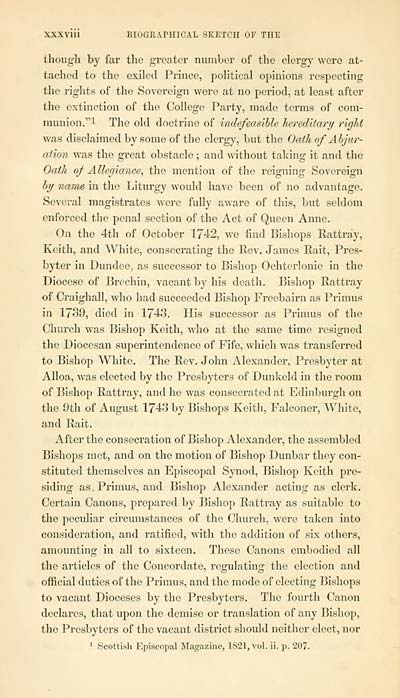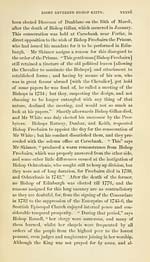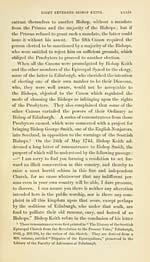Spottiswoode Society > History of the affairs of the Church and State of Scotland from the beginning of the reformation to the year 1568 > Volume 1
(46) Page xxxviii
Download files
Complete book:
Individual page:
Thumbnail gallery: Grid view | List view

XXXV111 BIOGRAPHICAL SKETCH OF THE
though by far the greater number of the clergy were at-
tached to the exiled Prince, political opinions respecting
the rights of the Sovereign were at no period, at least after
the extinction of the College Party, made terms of com-
munion."" 1 The old doctrine of indefeasible hereditary right
was disclaimed by some of the clergy, but the Oath of Abjur-
ation was the great obstacle ; and without taking it and the
Oath of Allegiance, the mention of the reigning Sovereign
by name in the Liturgy would have been of no advantage.
Several magistrates were fully aware of this, but seldom
enforced the penal section of the Act of Queen Anne.
On the 4th of October 1742, we find Bishops Rattray,
Keith, and White, consecrating the Rev. James Rait, Pres-
byter in Dundee, as successor to Bishop Ochterlonie in the
Diocese of Brechin, vacant by his death. Bishop Rattray
of Craighall, who had succeeded Bishop Freebairn as Primus
in 1739, died in 1743. His successor as Primus of the
Church was Bishop Keith, who at the same time resigned
the Diocesan superintendence of Fife, which was transferred
to Bishop White. The Rev. John Alexander, Presbyter at
Alloa, was elected by the Presbyters of Dunkeld in the room
of Bishop Rattray, and he was consecrated at Edinburgh on
the 9th of August 1743 by Bishops Keith, Falconer, White,
and Rait.
After the consecration of Bishop Alexander, the assembled
Bishops met, and on the motion of Bishop Dunbar they con-
stituted themselves an Episcopal Synod, Bishop Keith pre-
siding as. Primus, and Bishop Alexander acting as clerk.
Certain Canons, prepared by Bishop Rattray as suitable to
the peculiar circumstances of the Church, were taken into
consideration, and ratified, with the addition of six others,
amounting in all to sixteen. These Canons embodied all
the articles of the Concordate, regulating the election and
official duties of the Primus, and the mode of electing Bishops
to vacant Dioceses by the Presbyters. The fourth Canon
declares, that upon the demise or translation of any Bishop,
the Presbyters of the vacant district should neither elect, nor
1 Scottish Episcopal Magazine, 1821, vol. ii. p. 207.
though by far the greater number of the clergy were at-
tached to the exiled Prince, political opinions respecting
the rights of the Sovereign were at no period, at least after
the extinction of the College Party, made terms of com-
munion."" 1 The old doctrine of indefeasible hereditary right
was disclaimed by some of the clergy, but the Oath of Abjur-
ation was the great obstacle ; and without taking it and the
Oath of Allegiance, the mention of the reigning Sovereign
by name in the Liturgy would have been of no advantage.
Several magistrates were fully aware of this, but seldom
enforced the penal section of the Act of Queen Anne.
On the 4th of October 1742, we find Bishops Rattray,
Keith, and White, consecrating the Rev. James Rait, Pres-
byter in Dundee, as successor to Bishop Ochterlonie in the
Diocese of Brechin, vacant by his death. Bishop Rattray
of Craighall, who had succeeded Bishop Freebairn as Primus
in 1739, died in 1743. His successor as Primus of the
Church was Bishop Keith, who at the same time resigned
the Diocesan superintendence of Fife, which was transferred
to Bishop White. The Rev. John Alexander, Presbyter at
Alloa, was elected by the Presbyters of Dunkeld in the room
of Bishop Rattray, and he was consecrated at Edinburgh on
the 9th of August 1743 by Bishops Keith, Falconer, White,
and Rait.
After the consecration of Bishop Alexander, the assembled
Bishops met, and on the motion of Bishop Dunbar they con-
stituted themselves an Episcopal Synod, Bishop Keith pre-
siding as. Primus, and Bishop Alexander acting as clerk.
Certain Canons, prepared by Bishop Rattray as suitable to
the peculiar circumstances of the Church, were taken into
consideration, and ratified, with the addition of six others,
amounting in all to sixteen. These Canons embodied all
the articles of the Concordate, regulating the election and
official duties of the Primus, and the mode of electing Bishops
to vacant Dioceses by the Presbyters. The fourth Canon
declares, that upon the demise or translation of any Bishop,
the Presbyters of the vacant district should neither elect, nor
1 Scottish Episcopal Magazine, 1821, vol. ii. p. 207.
Set display mode to: Large image | Transcription
Images and transcriptions on this page, including medium image downloads, may be used under the Creative Commons Attribution 4.0 International Licence unless otherwise stated. ![]()
| Permanent URL | https://digital.nls.uk/79597340 |
|---|
| Description | Volume I. |
|---|---|
| Attribution and copyright: |
|

